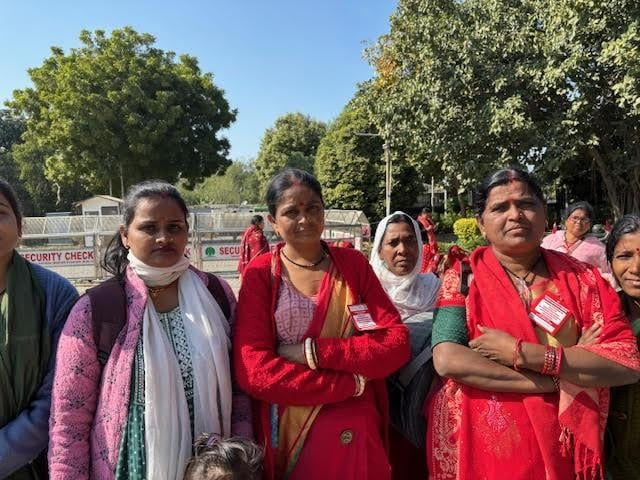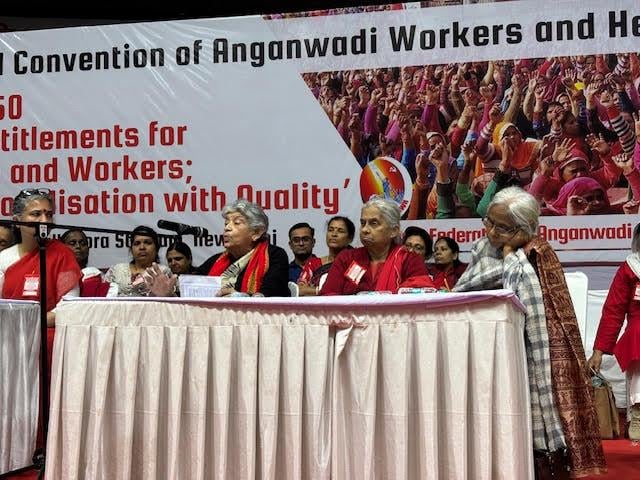New Delhi: Thousands of anganwadi workers and helpers assembled in the national capital on Thursday to demand institutionalisation of the Integrated Child Development Scheme (ICDS) and scrapping the plans for its privatisation.
At a national convention of anganwadi workers and helpers at the Talkatora Stadium in the national capital, the workers said it was imminent for government to acknowledge their contribution in keeping children and their mothers healthy, more so after the Supreme Court judgement. They also demanded payment of gratuity to them.
Raising the slogans like ‘Inquilab Zindabad’, ‘Institutionalise ICDS’, the participants also demanded a legislation to ensure right to early childhood care, education and development for children under six with anganwadi centres as nodal agencies. The convention also demanded scrapping of the four labour codes. Rajya Sabha MPs John Brittas, A A Rahim and V Sivadasan, All India Kisan Sabha general secretary Vijoo Krishnan and others too expressed their solidarity at the convention.
Addressing the convention, renowned economist s Utsa Patnaik said pointed out the “deliberate attempts” by successive governments to weaken the ICDS that played an import important role in building a healthy workforce post- Independence. She said that the colonial rule of 200 years meant not only oppression of ordinary citizens, but also the killing of millions in orchestrated famines by restricting access of foodgrains to them.
“At least 10 million people died in Bengal famine in 1770. What must be noted that this famine alone wiped out one third of the entire population of Bengal. Yet, we have very few accounts where the horrors of famine are documented. Similarly, in 1943, Bengal faced another famine, which killed 3 million people. It was the experience of such famines that the governments in post-Independence India resolved to fight hunger and ensure elimination of malnutrition,” she said.

Patnaik said three decades of the new economic policy had brought a similar situation that was existing in 1947 in terms of per capita foodgrain consumption.
“This grim situation arrived because governments revoked the protections enjoyed by common farmers and workers. Our governments signed free trade agreements with many countries. In international markets, prices of foodgrains are very volatile. Earlier, we could not export foodgrains until our demands under the Public Distribution System (PDS) were met. Now, with the protections revoked, our traders can export without fulfilling domestic demand and that results in shortfall of foodgrains,” she added.
In her address, A R Sindhu, national secretary, Centre of Indian Trade Unions (CITU) said it was the anganwadi workers who know that the country may face a similar situation like the famine in 1770 if the problem of malnutrition and hunger is not prioritised.
“Our Prime Minister is visiting every country to declare that we have become a global leader, whereas we are working with empty stomachs and our children are malnourished and stunted. Anaemia among mothers has increased by 8% in past three years,” she said, adding that ICDS was going to complete 50 years this year and there had to be an evaluation “if we need a more comprehensive scheme to ensure proper nutrition of our children.”
“Our budget has been cut year-on-year. The last increase in allocation toward payment to anganwadi workers and helpers was in 2018. Similarly, the last increase toward procurement of ration in anganwadi centres was in 2017,” Sindhu said.
The CITU leader said, “without ICDS, our children can’t stand on their feet. Around eight lakh children died due to malnutrition. In other words, 20,500 children are dying each day due to malnourishment. This is not my data. It has been provided by the government. So, we must understand the importance of this scheme.”
Highlighting the exploitation of anganwadi workers by the governments, Sindhu said, “If they need assistance in collecting the data for Census, we would be summoned. If they need to count cattle, we will be called. For any survey, we may be summoned. We are even being told to manipulate the data through Poshan tracker. In Covid, everyone received ration through PDS. Now they (government) are hell bent on denying ration to people. If your Aadhaar is not linked to your ration card, you may be denied ration. Your photo has to be clicked with GPS location and uploaded on this tracker. You have to click the photo of a three-month child and after three months, if child’s face is not recognised by the software, the beneficiary may be denied ration and the workers’ salary may also be cut. This is why we need to fight.”
Sharing her experience of the working conditions, Sangeetaben Dave, who came from Rajkot in Gujarat, told NewsClick that anganwadi workers of the state fought a long legal battle to secure their gratuity. However, the struggle was now concentrated on ensuring minimum wages.
“The Gujarat High Court has told the state government to pay us gratuity. The payment of gratuity automatically recognises us as full-time workers, not scheme or contract workers. Thus, we are demanding a full-fledged salary of Rs 26,000 per month. Officially, we work for six hours a day. However, our sisters work round the clock, from filling the registers to uploading the data for every assigned task. If you are taking the work of a full-time workers, why are you not paying us the salary?” she added.
When asked about their honorarium, Dave said ICDS was sponsored by both the state government and the Union government. “The Gujarat government has increased our remuneration but the Centre has not increased a single penny after 2018. (Prime Minister) Modi ji talks about women’s empowerment but he is depriving us of our rightful dues. They depute us in Census and election duties. They even summon us to fill the stadium when PM Modi visits the state.” She added.
Kashi Vishwakarma, who came from Katni, Madhya Pradesh, said workers were concerned over privatisation of the scheme.
“The government had announced five years ago that the nutritious supplementary material in Madhya Pradesh will be provided by self-help groups and women’s cooperatives. However, it is supplied through a big company in Devas. Big NGOs have been handed over the contract to supply the cooked material. The entire exercise is defeating the purpose of empowering women,” she added.
Courtesy: Newsclick

